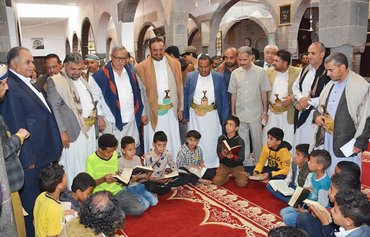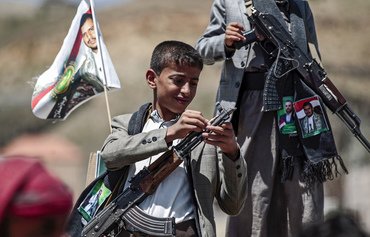Yemeni officials and human rights activists accuse the Iran-backed Houthis (Ansarallah) of deliberately targeting journalists and media institutions in order to eliminate all witnesses to their crimes against civilians.
In a report issued on World Press Freedom Day (May 3rd), the Human Rights Office in Sanaa documents the numerous violations the Houthis have committed against journalists in the Sanaa administrative district.
The report, titled "Assassination of the Word", lists 6,291 violations the militia has committed against journalists, media professionals and media institutions in Sanaa in the period between September 21st, 2014 and April 30th, 2020.
"Freedom of the media and the press in Yemen is going through the worst period in its history, starting since the coup staged by the Iran-backed Houthis," Information Minister Muammar al-Eryani said in a May 3rd statement.
"We remember the dozens of martyrs, journalists and media professionals who were assassinated" by the Houthis, he said.
The nation also remembers those who have been held in Houthi detention centres for up to five years, he said, "during which they were subjected to psychological and physical torture and illegal trials".
Four of these prisoners are now facing death sentences, he said.
Journalists in Houthi-controlled areas continue to work in an environment Reporters without Borders has described as "one of the most dangerous and hostile environments in the world", he said.
'Worst times' for Sanaa media
"Journalism is going through its worst times," in Sanaa in particular, and in Houthi-controlled areas in general, Sanaa Human Rights Office director general Fahmi al-Zubairi told Al-Mashareq.
"The violations listed by the report are divided into 17 categories," he said.
These include extrajudicial killings, attempted murder, threats, arbitrary abduction, forced disappearance, political trials, injuries, torture, detention, physical assault, house arrest and the looting of media institutions, he said.
They also include exclusion, abuse, dismissal from employment, the looting of food aid allocated to media professionals and forced displacement, he added.
Al-Zubairi said the Houthis have pursued a policy of "silencing voices to erase the role" of media institutions, which it forcibly seized and brought under its control.
The Houthis have attempted to suppress "every media voice that exposed its violations and actions against civilians", he added.
Hundreds of journalists and media professionals and their families have been displaced from their homes because of "the dangers, fear, persecution and constant threats made by the Houthis", al-Zubairi said.
The May 3rd report was prepared by the Sanaa Human Rights Office's monitoring and documentation team.
"The monitoring team worked in very dangerous conditions to obtain the documented statistics, proving the Houthis' involvement in committing crimes against civilians in the Sanaa administrative district," he said.
The team followed "the methodology of inquiry and investigation, field visits, personal interviews with the victims and their relatives, verification of witness testimonies, and sorting, analysing and confirming the veracity of the data".
Journalists have been targets
Lawyer and human rights activist Abdul Rahman Berman noted the vast number of violations, pointing out that they were concentrated in Sanaa.
The city is the Yemeni capital, he said, and "it is natural that media institutions, satellite channels, local radio stations, newspapers and news sites would be concentrated in it".
The Houthis overran Sanaa in September of 2014, and the legitimate government later designated Aden as the country's temporary capital.
"Many journalists were displaced from Sanaa and some of them took up other work, in order to secure the minimum living requirements for themselves and their families," political analyst Faisal Ahmed told Al-Mashareq.
He accused the Houthis of using teams to monitor social media posts that are hostile to the militia or are critical of its efforts to silence opposing voices.
"The Houthis have forcibly arrested between 250 and 300 journalists in the areas under their control over the past years," said Yemeni Journalists Syndicate administrative board member Nabil al-Osaidi.
The journalists have been detained "for varying periods of time, and 14 of them are still in Houthi prisons", he told Al-Mashareq.
When the Houthis overran Sanaa, al-Osaidi said, they seized media outlets and detained journalists "to leave no witness to their crimes and ensure they are not reported to the world".

![Yemeni journalists hold placards to support their colleagues jailed in Houthi prisons in Yemen in this file photo from a May 5th, 2016 press conference at the information ministry in Kuwait City. [Yasser al-Zayyat/AFP]](/cnmi_am/images/2020/05/25/24145-Yemen-journalists-sanaa-600_384.jpg)






